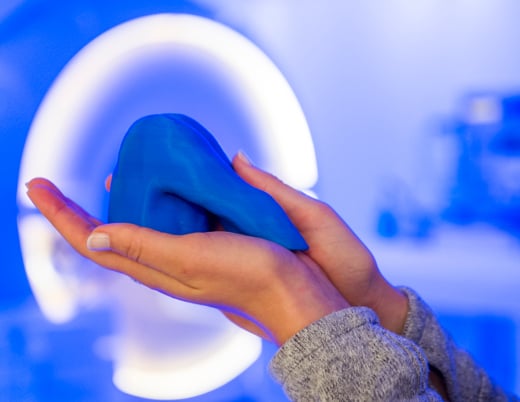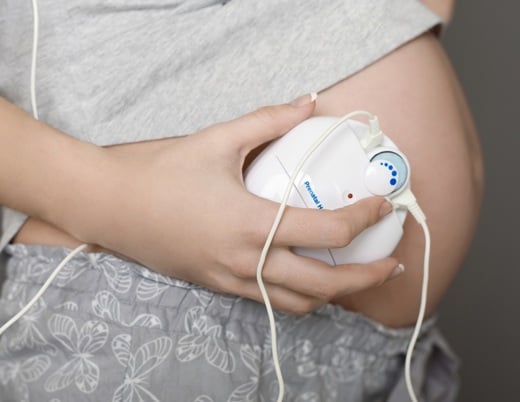Can wound infusion pumps help reduce opioid use after cesarean delivery?
According to the CDC’s National Center for Health Statistics, cesarean delivery is one of the most common surgical procedures in the U.S., accounting for 32% of all deliveries. As one of only a few freestanding children’s hospitals in the nation with a dedicated labor and delivery unit for high-risk pregnancies, the Colorado Fetal Care Center at Children’s Hospital Colorado performs its fair share.
“These are moms who are going through so much already. We want to do everything we can to help them care for and interact with their baby, while providing optimum pain control,” says obstetric anesthesiologist Cristina Wood, MD, Medical Director of Obstetric Anesthesia at the Colorado Fetal Care Center.
Historically, care providers at the Colorado Fetal Care Center used a multimodal pain management regimen for patients that typically included the use of opioids. For some patients, the regimen also included a wound infusion pump. Dr. Wood likens it to a little garden hose that sits underneath the incision for a 48-hour continuous infusion of the local anesthetic bupivacaine.
“Our use of the pump was sporadic,” she says. “And there’s conflicting literature on whether the pump can improve care, due to the heterogeneity of the studies. So, we saw an opportunity for improvement.”
Studying wound infusion pumps
Lead Ob/Gyn Hospitalist Frank Chow, MD, and a team of Children’s Colorado specialists completed a retrospective review of cesarean deliveries at the Colorado Fetal Care Center from January 2015 through March 2016. The team, which included Michael Zaretsky, MD, Medical Director of the Colorado Fetal Care Center, alongside clinical manager Marilyn Hernandez, RN, pediatric anesthesiologist Melissa Masaracchia, MD, and Dr. Wood, compared postoperative opioid use between patients who received the standard multimodal pain management and those who received the same regimen with the continuous infusion of bupivacaine.
Dr. Chow says the team initiated the study to demonstrate objectively that the addition of the wound infusion pump after cesarean delivery would decrease postoperative narcotic use by new moms.
“We saw approximately a 30% reduction in narcotic usage as a result,” he says. “A bonus finding was that the patients were happier because they were moving around better and had an easier time visiting their babies in the neonatal and cardiac intensive care unit.” The Colorado Fetal Care Center has since universally implemented the pump as part of its multimodal postoperative pain management strategy for all cesarean deliveries.
Enhanced recovery plus the wound pump
In 2019, the Colorado Fetal Care Center earned the Center of Excellence designation from the Society for Obstetric Anesthesia and Perinatology. With that designation came a focus on enhanced recovery after a cesarean section, or ERAC. Nationally recommended protocols for ERAC include directives like scheduling non-narcotic medications postoperatively, limiting intraoperative IV fluids to reduce bowel swelling, implementing prophylactic anti-emetic medication, removing urinary catheters earlier and ambulating the same day of surgery.
“It was a huge protocol we rolled out in January 2020,” says Dr. Wood. “And in line with our work related to the reduction of opioid usage with the wound infusion pump, we certainly wanted to see if these enhanced recovery efforts in combination with the pump would drop that 30% reduction even further.”
It did. A retrospective analysis of cesarean deliveries at the Colorado Fetal Care Center from 2015 through 2020 found that there was more than an 80% reduction in postoperative narcotic usage when a wound pump was incorporated with the ERAC protocol. Also notable, the researchers found that a third of patients never took a single narcotic pain pill after the cesarean delivery.
“These findings show an impressive decrease in opiate use after cesarean delivery,” says Dr. Chow, “and have significantly contributed to postoperative pain management and patient satisfaction at Children’s Colorado.”
Dr. Masaracchia presented the study “Enhanced Recovery After Cesarean Delivery Pathway Reduces Opioid Consumption” at the Society for Maternal Fetal Medicine’s 41st Annual Pregnancy Meeting on January 28, 2021.
Featured Researchers

Cristina Wood, MD
Medical Director Obstetric Anesthesia, Maternal Fetal Care Unit
Pediatric Anesthesiology
Children's Hospital Colorado
Associate professor
Anesthesiology
University of Colorado School of Medicine

Frank Chow, MD
Lead Ob/Gyn Hospitalist
Colorado Fetal Care Center
Children’s Hospital Colorado
Sr. Instructor
OB-GYN-Gyn and OB Health
University of Colorado School of Medicine

Michael Zaretsky, MD
Director of Research
Colorado Fetal Care Center
Children's Hospital Colorado
Professor
OB-GYN-Maternal Fetal Medicine
University of Colorado School of Medicine
Marilyn Hernandez, RN
Clinical manager
Children's Hospital Colorado
Melissa Masaracchia, MD
Pediatric anesthesiologist
Children's Hospital Colorado





 720-777-0123
720-777-0123










